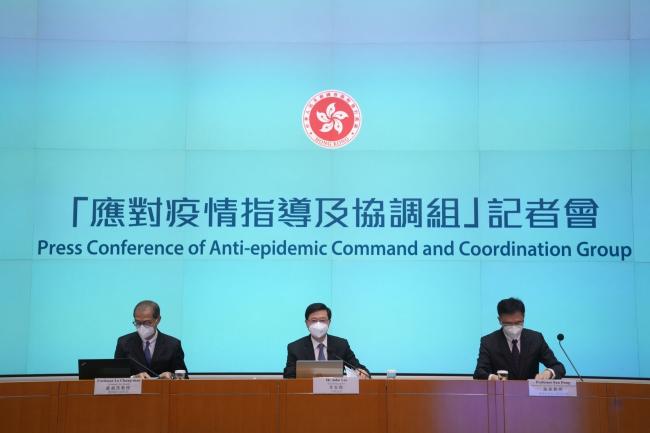(Bloomberg) -- Hong Kong will reduce the period of time arrivals must spend in hotel quarantine to three days, plus four days of health monitoring, the latest move to ease travel restrictions that have largely isolated the Asian financial hub throughout the pandemic.
People arriving in Hong Kong from overseas will need to spend three days in hotel quarantine and can then serve their four days of health monitoring, which will coincide with movement restrictions, at home or in a hotel, Chief Executive John Lee said Monday. The four-day period carries relatively loose rules, with travelers able to leave their homes and only restricted from high-risk places. The new rules come into effect Friday.
The easier-to-endure quarantine period follows the removal of flight suspensions on July 7 that imposed snap bans on certain routes if they inadvertently brought in passengers infected with Covid, making it difficult for travelers to plan their trips. The easing measures implemented during Lee’s early days in office are part of his plan to restore the city’s stature without alienating Chinese officials committed to rooting out the virus.
“We want to reduce the impact from quarantine on our economic activities as well as our connection with the world,” Lee said at a briefing.
Anticipation had been building for weeks that the new administration would cut the seven-day hotel quarantine that international travelers face when entering the city. While Lo said in late June he aimed to reduce the duration of quarantine to five days, there’s been little progress until now. A planned press conference on the issue on Friday was canceled due to unresolved technical problems, the South China Morning Post reported.
The city’s strict rules -- at a time when much of the rest of the world has abandoned Covid curbs -- have deterred travelers and undermined Hong Kong’s future as an international finance center. The slow pace of reducing quarantine also shows the city’s struggle to balance limiting new Covid cases and opening up its international borders.
Reduced quarantine may not entirely ease headaches for travel into Hong Kong. Rooms are in short supply, costs are high, while anyone who is infected in the days before their trip are forced to delay travel. Once inside the city, public gatherings of more than four people are still banned -- though indoor events can be larger -- and masks are mandatory.
Health Code
Officials also unveiled a tiered health-code system reminiscent of what’s used in mainland China. A yellow code will be given to inbound travelers once they finish mandatory quarantine, while anyone testing positive will be given a red code. A blue code will be shown in the city’s LeaveHomeSafe app once the quarantine or health monitoring period has ended.
There’s little sign Hong Kong will abandon its cautious approach toward the virus, even as curbs weigh on the economy. Gross domestic product contracted 1.4% in the second quarter from a year earlier. The city reported more than 4,000 infections on Sunday.
Schools will continue to operate under half-day class arrangements in the upcoming school year until further notice, the government said on Friday. An isolation facility with 3,000 units at the site of the city’s old airport has just been launched, with the security minister highlighting sea views from some of the rooms in a social media post.
Why China Is Sticking With Its Covid Zero Strategy: QuickTake
(Updates to add details throughout.)
©2022 Bloomberg L.P.
